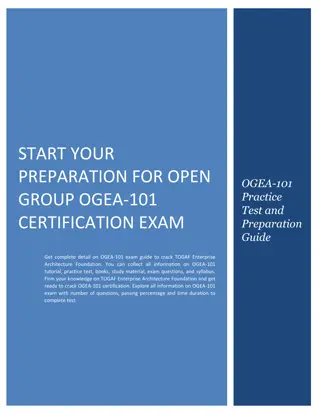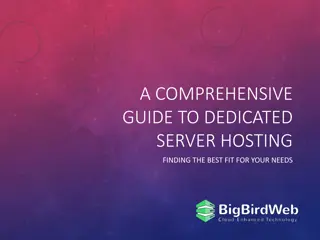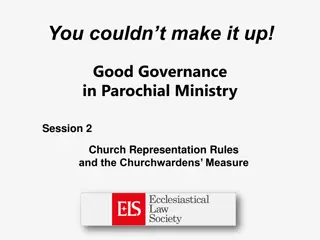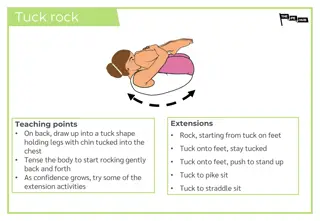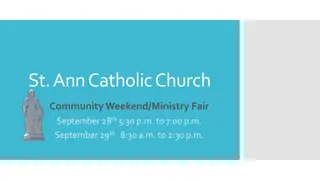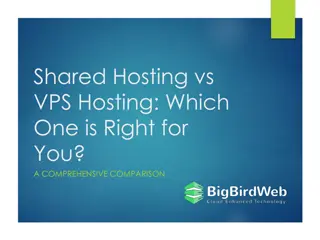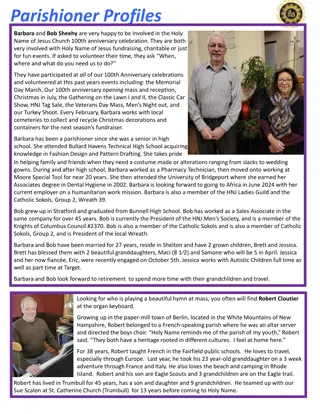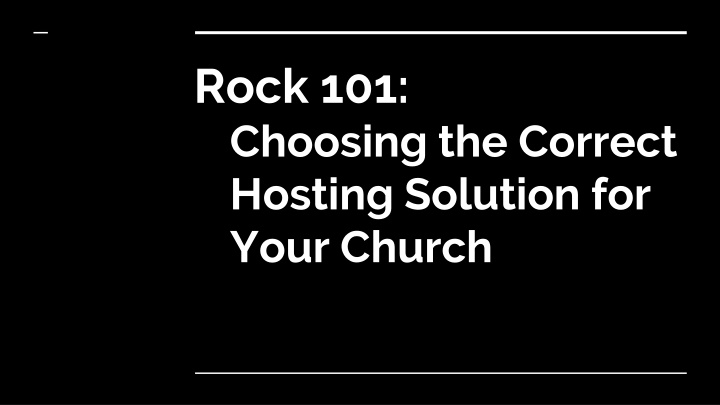
Choosing the Best Hosting Solution for Your Church with RockRMS
Ensure a secure, reliable, and efficient environment for your church's RockRMS usage by selecting the right hosting solution. Consider technical requirements, security, reliability, budget considerations, and hosting options to make an informed decision that aligns with your church's needs and growth.
Download Presentation

Please find below an Image/Link to download the presentation.
The content on the website is provided AS IS for your information and personal use only. It may not be sold, licensed, or shared on other websites without obtaining consent from the author. If you encounter any issues during the download, it is possible that the publisher has removed the file from their server.
You are allowed to download the files provided on this website for personal or commercial use, subject to the condition that they are used lawfully. All files are the property of their respective owners.
The content on the website is provided AS IS for your information and personal use only. It may not be sold, licensed, or shared on other websites without obtaining consent from the author.
E N D
Presentation Transcript
Rock 101: Choosing the Correct Hosting Solution for Your Church
Why it matters.. Choosing the right hosting solution will provide a secure, reliable, and efficient environment for a church to use RockRMS, allowing it to focus more on its core mission rather than on technical issues.
What to Consider When Choosing Hosting?
Technical Requirements Storage Needs Scalability and flexibility requirements: As your church grows, so will your data and user load. Look for a provider that allows for easy scalability of resources. Do I need more power on Sunday s or another day of the week than I do during the week? Backup and Recovery: Does the hosting provider offer robust backup and recovery option to protect against data loss. Bandwidth: Ensure the provider can handle the amount of data transfer your church requires.
Security & Reliability Uptime: Uptime is the measure of how often your Rock system is available. Look for a hosting provider with a high uptime guarantee (e.g., 99.9%). What is my churches tolerance for outages and downtime? Security: Look for a provider that offers strong security measures, such as firewalls, SSL certificates, and others to protect sensitive data. What type of backup and disaster recovery options do I need? Are we looking for a specific service level agreement that guarantees by system will be up?
Budget & Cost Considerations Initial setup costs (especially for a self hosted scenero) Ongoing costs (partner hosting and cloud hosting) Don t overlook the best solution in favor of the cheapest price. (There are a lot of ways to host Rock very inexpensively from a purely financial perspective that are going to cost your church more in time and lost trust.
What are my hosting options Onsite / Self Hosted Cloud Hosted (or Partner Hosted) Partner Managed
Self Hosted. The church installs and runs the RockRMS software on its own servers or infrastructure. Advantages: This method gives the church full control over the management, configuration, and operation of the software, including data security, updates, and integration with other systems. Disadvantages: Self-hosting requires more technical expertise but provides more flexibility and potential cost savings than using a hosted solution. (*If you church already has the expertise and infastrure to do this)
Self Hosted. (continued) Advantages: This method gives the church full control over the management, configuration, and operation of the software, including data security, updates, and integration with other systems. Disadvantages: Self-hosting requires more technical expertise but provides more flexibility and potential cost savings than using a hosted solution. (*If you church already has the expertise and infastrure to do this)
Cloud Hosted. The church utilizes a third-party service provider's infrastructure to install and run the RockRMS software.
Cloud Hosted. (continued) Advantages: Typically requires less technical expertise from the church, allows for easy scalability, and provides high reliability (when configured correctly) Cloud providers usually have robust data backup and recovery processes in place, so in case of any data loss, it can be restored easier than other traditional hosting methods. Cloud hosting services typically have multiple servers in different locations, which increases redundancy and uptime. If one server goes down, others can pick up the slack, reducing the risk of downtime. With cloud hosting, you usually pay only for the resources you use. This can be more cost- effective than investing in and maintaining your own servers, especially if your usage is variable or if you only need a larger capacity one day of the week (like Sunday).
Cloud Hosted. (continued) Disadvantages: Costs can quickly add up over time. Depending on the amount of data and amount of traffic, cloud hosting could end up being more expensive than other options over time. With cloud hosting, you're essentially renting a portion of someone else's server. This means you may not have the same level of control over your server environment as you would with a self- hosted solution. With cloud hosting, you're reliant on the provider for many aspects, including uptime, security, and updates. If the provider experiences downtime or other issues, it could directly affect your RockRMS functionality. (note that many times the providers are better at hosting that most churches so this may not be an issue) Since your data is hosted in the cloud, you'll need a stable internet connection to access it. If your internet goes down, you may not be able to access your RockRMS system until it's restored.
Cloud Hosted. (continued) Providers Microsoft Azure Amazon Web Services (AWS) Tip Google Cloud Platform (GCP) Microsoft Azure hosting is well documented on the community website in the Rock Solid Azure Hosting manual. *While these providers offer systems compatible with RockRMS, this is not a recommendation to use their services.
Partner Managed Hosting. A trusted third-party partner* (usually a tech company or service provider experienced with RockRMS) hosts and manages the RockRMS application for the church. *All Partner Managed Hosting providers are approved by Sparkability (RockRMS) and must meet a specific set of requirements.
Partner Managed Hosting. Who primarily benefits from Partner Managed Hosting? Partner managed hosting can be a great option for churches that may not have the in-house technical expertise to manage the hosting themselves or prefer to focus on their primary mission rather than technical matters. It provides the benefits of a professionally managed hosting environment without the need for the church to deal directly with the complexities of server management, security, and performance optimization.
Partner Managed Hosting. (continued) Advantages: The third-party partner would handle all the technical aspects related to hosting the RockRMS software, including: Server management: The partner would handle all tasks related to managing the server where RockRMS is hosted, including maintenance, updates, and ensuring uptime. Security: The partner would be responsible for ensuring the server is secure, protecting the data of the church and its members. Privacy & Exportability: Your data is separately from other organizations. This guarantees the privacy of your data for your organization as well as the individuals you serve. Should you ever decide to use another hosting platform, your data will always be available for export and can be moved to another provider. Performance optimization: The partner would monitor and adjust the hosting environment as needed to ensure optimal performance of the RockRMS application. Technical support: The partner would provide technical support, troubleshooting, and issue resolution for any problems related to the hosting of the RockRMS software.
Partner Managed Hosting. (continued) Disadvantages: Cost: Partner managed hosting often comes at a higher price point than self-hosting or regular cloud hosting, due to the added value of management and support services. Control: With a Rock partner managing the hosting, the church may have less control over certain aspects of the hosting environment. (Such as not being able to remote into the physical server). There may also be restrictions on customizations or configurations that can be done. Data Privacy: With a third-party handling the hosting, sensitive church data is in their hands. While providers follow security protocols, there's always a risk associated with having sensitive data managed by an external party.
Partner Managed Hosting. (continued) Providers Rock Cloud by TriumpTech Possibly more coming . visit https://www.rockrms.com/hosting
Best Practices for Selecting a Hosting Solution Asses your churches needs and goals especially around technical requirements, cost, support and scalability. Consider consulting with a Rock Partner to help you select the best hosting option for your church. Consider future growth and scalability. Don t lock yourself into a long term commitment that s undersized for your needs. Have a conversation with your churches leadership team on these topics, don t just assume they want the lowest cost solution. Guide them in choosing the best solution.


